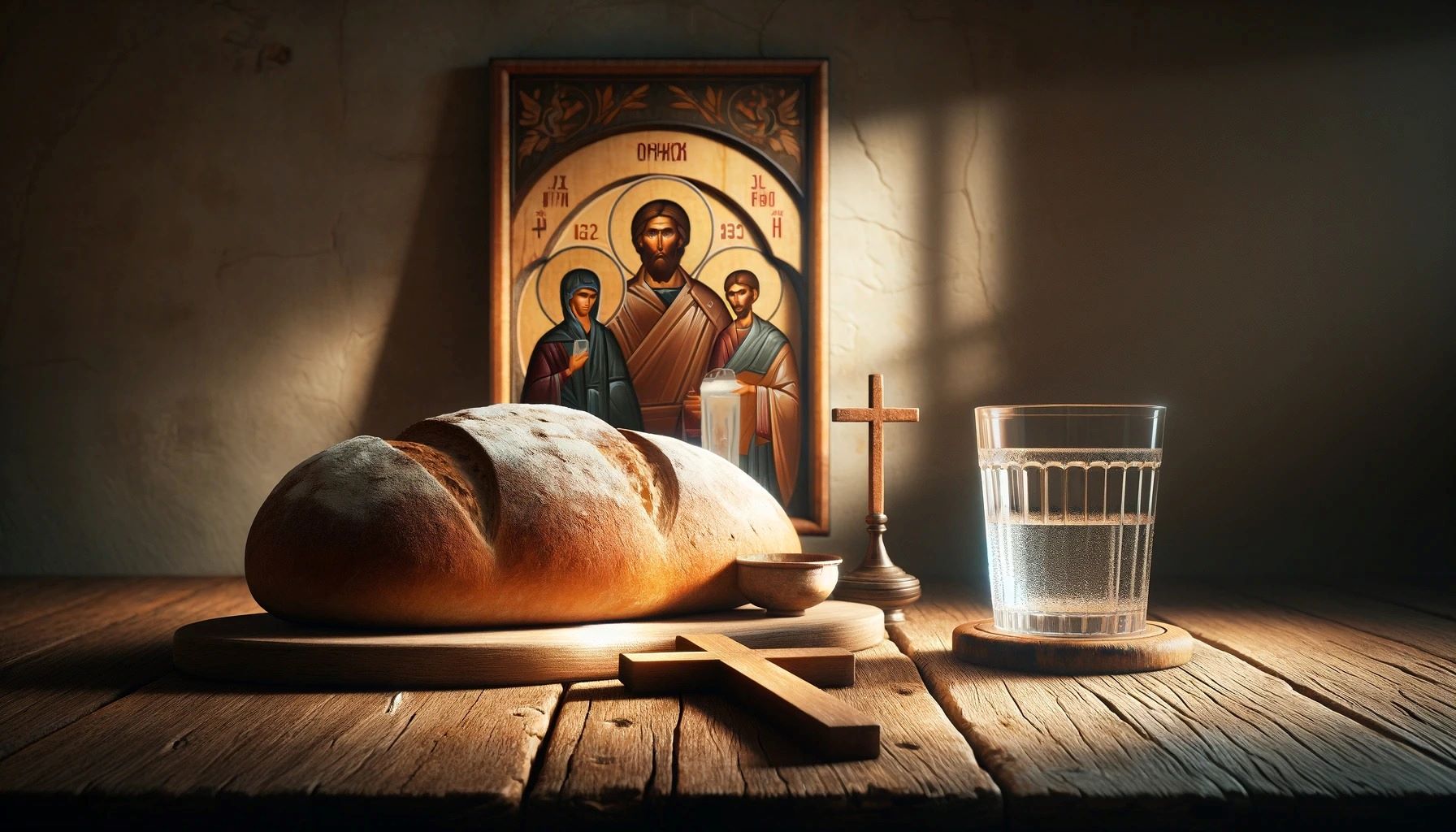Home>Special Themes>What Is Penance During Lent


Special Themes
What Is Penance During Lent
Published: February 29, 2024
Peter Smith, Editorial Director at Christian.net, combines deep insights into faith, politics, and culture to lead content creation that resonates widely. Awarded for his contributions to religious discourse, he previously headed a major organization for religious communicators, enhancing dialogue on faith's societal impacts.
Discover the significance of penance during Lent and how it relates to the special themes of this sacred season. Explore the spiritual practices and traditions associated with penance.
(Many of the links in this article redirect to a specific reviewed product. Your purchase of these products through affiliate links helps to generate commission for Christian.net, at no extra cost. Learn more)
Table of Contents
The Meaning of Penance
Penance, in the context of religion, refers to the act of seeking forgiveness for sins through various forms of self-discipline, repentance, and acts of atonement. It is a fundamental aspect of many religious traditions, including Christianity, where it is often practiced during the Lenten season. The concept of penance is rooted in the belief that individuals are accountable for their actions and must take responsibility for any wrongdoing. It is a way of acknowledging one's faults, seeking reconciliation with God, and striving for spiritual renewal.
Penance is not merely about feeling sorry for one's sins; it involves taking concrete actions to demonstrate genuine remorse and a commitment to change. It is a deeply personal and introspective process that requires individuals to reflect on their behavior, acknowledge their mistakes, and actively seek reconciliation with God and others. Penance is often associated with acts of self-denial, such as fasting, abstinence, and prayer, as well as performing acts of charity and kindness towards others. These actions are intended to demonstrate a sincere desire for spiritual growth and a willingness to make amends for past transgressions.
The practice of penance is deeply rooted in the belief that God is merciful and forgiving, and that through genuine repentance and atonement, individuals can experience spiritual healing and restoration. It is a way of seeking reconciliation with God and embracing the opportunity for personal transformation. Penance is not about self-punishment, but rather a humble recognition of one's imperfections and a sincere effort to realign one's life with the values and teachings of the faith.
Penance is also a communal practice within many religious traditions, where individuals come together to support and encourage each other in their spiritual journey. It is a reminder that all individuals are part of a larger community of believers, and that the pursuit of spiritual growth is a shared endeavor. Through the practice of penance, individuals not only seek personal reconciliation with God but also contribute to the collective spiritual well-being of their community.
In summary, penance during Lent is a profound expression of faith, humility, and a genuine desire for spiritual renewal. It is a deeply personal and communal practice that embodies the principles of repentance, forgiveness, and reconciliation. Through acts of self-discipline, reflection, and atonement, individuals seek to deepen their relationship with God and embrace the transformative power of spiritual growth.
Read more: What Is Almsgiving During Lent?
The Purpose of Penance During Lent
-
Seeking Spiritual Renewal: The primary purpose of penance during Lent is to seek spiritual renewal. By engaging in acts of self-discipline, repentance, and atonement, individuals strive to cleanse their hearts and minds, and renew their commitment to living in accordance with the teachings of their faith.
-
Acknowledging Human Frailty: Penance during Lent serves as a reminder of human frailty and the universal experience of falling short of moral and spiritual ideals. It is an opportunity for individuals to acknowledge their imperfections and seek forgiveness for their shortcomings.
-
Preparing for Easter: Lent is a period of preparation for the celebration of Easter, the most significant event in the Christian calendar. Through the practice of penance, individuals prepare themselves spiritually to fully embrace the joy and significance of Easter, which commemorates the resurrection of Jesus Christ.
-
Deepening Relationship with God: Penance during Lent provides a focused opportunity for individuals to deepen their relationship with God. By engaging in acts of self-denial, prayer, and reflection, individuals seek to draw closer to God, seeking His guidance, forgiveness, and grace.
-
Experiencing Personal Transformation: The purpose of penance during Lent is to facilitate personal transformation. Through acts of self-discipline and atonement, individuals aim to cultivate virtues such as humility, self-control, and compassion, leading to a more profound spiritual growth.
-
Expressing Gratitude and Love: Penance during Lent is an expression of gratitude and love for the sacrificial love of Jesus Christ. By emulating Christ's selflessness and sacrifice, individuals demonstrate their appreciation for the ultimate act of love and redemption.
-
Reaffirming Commitment to Faith: Engaging in penance during Lent allows individuals to reaffirm their commitment to their faith. It serves as a tangible expression of one's dedication to living a life that reflects the values and principles of their religious beliefs.
-
Fostering Compassion and Empathy: Through acts of charity and kindness, individuals practicing penance during Lent cultivate a spirit of compassion and empathy towards others. This fosters a sense of interconnectedness and solidarity within the community of believers.
In essence, the purpose of penance during Lent is multifaceted, encompassing spiritual renewal, self-reflection, preparation for Easter, and the cultivation of virtues and values that are central to the practice of faith. It is a time of introspection, repentance, and a recommitment to living a life that is aligned with the teachings of one's religious tradition.
Types of Penance Practiced During Lent
-
Fasting: One of the most common forms of penance during Lent is fasting, which involves abstaining from certain foods or meals for a specific period. This practice is rooted in the biblical tradition of self-denial and spiritual discipline. By voluntarily limiting their food intake, individuals seek to cultivate a deeper sense of self-control, empathy for the hungry, and a heightened awareness of their spiritual hunger for God.
-
Abstinence: In addition to fasting, abstinence from specific types of food, such as meat, is a prevalent form of penance during Lent. This practice is a symbolic gesture of solidarity with the suffering of Christ and a means of redirecting one's focus from material comforts to spiritual nourishment. By abstaining from certain foods, individuals are reminded of the sacrifices made by Jesus and are encouraged to embrace a simpler, more contemplative way of life.
-
Prayer and Meditation: Engaging in intensified prayer and meditation is another essential aspect of penance during Lent. By dedicating more time to prayer, individuals seek to deepen their spiritual connection with God, seek guidance, and express gratitude for the gift of salvation. Through meditation, individuals reflect on their lives, seek inner peace, and open themselves to the transformative power of God's grace.
-
Acts of Charity and Service: Practicing acts of charity and service towards others is a tangible expression of penance during Lent. This may include volunteering at shelters, donating to charitable causes, or offering assistance to those in need. By extending kindness and compassion to others, individuals embody the spirit of selflessness and love, following the example of Jesus Christ's teachings.
-
Self-Denial and Sacrifice: Lent is a time for individuals to embrace various forms of self-denial and sacrifice as a means of penance. This may involve giving up certain luxuries, entertainment, or habits that detract from spiritual growth. By sacrificing personal comforts and desires, individuals demonstrate their commitment to prioritizing their relationship with God and living a life of greater simplicity and devotion.
-
Sacramental Reconciliation: Participating in the sacrament of reconciliation, also known as confession, is a vital form of penance during Lent for many Christians. This sacrament provides an opportunity for individuals to confess their sins, seek absolution, and receive spiritual counsel. Through this sacramental practice, individuals experience the healing and liberating grace of God's forgiveness, renewing their commitment to living a life of virtue and integrity.
-
Almsgiving: The practice of almsgiving, or giving to those in need, is an integral aspect of penance during Lent. By sharing their resources with others, individuals express solidarity with the marginalized and vulnerable members of society. Almsgiving fosters a spirit of generosity, justice, and social responsibility, reflecting the compassionate love of God for all humanity.
In essence, the types of penance practiced during Lent encompass a diverse range of spiritual disciplines and acts of self-denial, all aimed at fostering personal and communal transformation. These practices serve as tangible expressions of repentance, humility, and a sincere desire for spiritual growth and renewal.
How Penance Relates to Spiritual Growth
Penance is intricately linked to spiritual growth, serving as a transformative journey that nurtures the individual's inner being and strengthens their connection with the divine. The practice of penance fosters spiritual growth through the following ways:
-
Self-Reflection and Awareness: Engaging in acts of penance prompts individuals to reflect on their thoughts, actions, and intentions. This introspective process cultivates self-awareness, enabling individuals to recognize areas for personal improvement and spiritual development.
-
Cultivation of Virtues: Penance encourages the cultivation of virtues such as humility, self-discipline, and compassion. By embracing self-denial and acts of atonement, individuals develop a deeper understanding of their own vulnerabilities and the virtues necessary for spiritual maturity.
-
Renewal of Intentions: Through penance, individuals reaffirm their commitment to living a life aligned with the principles of their faith. This renewal of intentions fosters a sense of purpose and direction, guiding individuals towards a more meaningful and spiritually fulfilling existence.
-
Strengthening of Faith: Penance deepens an individual's faith by providing a tangible expression of their devotion and dedication to their religious beliefs. Through acts of self-discipline and repentance, individuals strengthen their trust in the divine and embrace the transformative power of spiritual growth.
-
Forgiveness and Reconciliation: Penance facilitates the experience of forgiveness and reconciliation, both with oneself and with the divine. By seeking forgiveness for past transgressions and striving for reconciliation, individuals experience emotional and spiritual healing, paving the way for personal growth and renewal.
-
Empathy and Compassion: Engaging in acts of charity and service as part of penance nurtures empathy and compassion towards others. This fosters a sense of interconnectedness and solidarity within the community of believers, contributing to the individual's spiritual growth through acts of selflessness and love.
-
Alignment with Spiritual Values: Penance encourages individuals to realign their lives with the spiritual values and teachings of their faith. This process of realignment fosters a deeper sense of harmony and coherence between one's beliefs and actions, leading to a more profound spiritual growth and fulfillment.
In essence, penance is a transformative journey that nurtures the individual's spiritual growth by fostering self-awareness, cultivating virtues, renewing intentions, strengthening faith, facilitating forgiveness and reconciliation, nurturing empathy and compassion, and aligning with spiritual values. It is a deeply personal and communal practice that embodies the principles of repentance, forgiveness, and reconciliation, ultimately leading to a more profound spiritual growth and renewal.
The Role of Penance in Lenten Observance
Penance plays a pivotal role in the observance of Lent, serving as a transformative and spiritually enriching practice that embodies the essence of the Lenten season. Its role encompasses various dimensions that contribute to the individual and communal experience of Lenten observance:
-
Spiritual Preparation: Penance serves as a means of spiritually preparing individuals for the commemoration of the passion, death, and resurrection of Jesus Christ during the Easter season. Through acts of self-discipline, repentance, and atonement, individuals engage in a process of inner purification and renewal, aligning their hearts and minds with the solemnity and significance of the Lenten journey.
-
Reflection and Repentance: Lenten penance provides a dedicated period for individuals to engage in deep reflection on their lives, acknowledge their shortcomings, and seek genuine repentance for their sins. This introspective process fosters a sense of humility and contrition, prompting individuals to turn away from behaviors that are contrary to their spiritual well-being and embrace a path of righteousness and virtue.
-
Emulation of Christ's Sacrifice: Penance during Lent invites individuals to emulate the sacrificial love and selflessness of Jesus Christ. By engaging in acts of self-denial, prayer, and charity, individuals seek to embody the spirit of Christ's sacrifice, expressing gratitude for the redemptive love demonstrated through His suffering and death on the cross.
-
Renewal of Faith and Commitment: The practice of penance during Lent offers an opportunity for individuals to renew their faith and recommit themselves to living a life that reflects the values and teachings of their religious tradition. Through acts of penance, individuals reaffirm their dedication to spiritual growth, seeking to deepen their relationship with God and live in accordance with the principles of their faith.
-
Community and Solidarity: Penance fosters a sense of communal solidarity and support within the faith community. As individuals engage in acts of penance, they are reminded that they are part of a larger community of believers, all striving for spiritual growth and renewal. This communal aspect of penance reinforces the interconnectedness and mutual support that characterize the Lenten observance.
-
Preparation for Reconciliation: Lenten penance prepares individuals for the sacrament of reconciliation, also known as confession, where they seek God's forgiveness and experience the liberating grace of reconciliation. Through the practice of penance, individuals cultivate a disposition of openness and contrition, preparing themselves to receive the sacramental absolution and experience spiritual healing.
-
Cultivation of Virtues: Penance provides a fertile ground for the cultivation of virtues such as humility, self-discipline, and compassion. By embracing acts of self-denial and atonement, individuals develop a deeper understanding of their own vulnerabilities and the virtues necessary for spiritual maturity, fostering a transformative inner growth.
In essence, the role of penance in Lenten observance is multifaceted, encompassing spiritual preparation, reflection and repentance, emulation of Christ's sacrifice, renewal of faith and commitment, community and solidarity, preparation for reconciliation, and the cultivation of virtues. It is a practice that invites individuals to embark on a journey of self-examination, spiritual renewal, and communal solidarity, ultimately leading to a deeper and more meaningful observance of the Lenten season.















